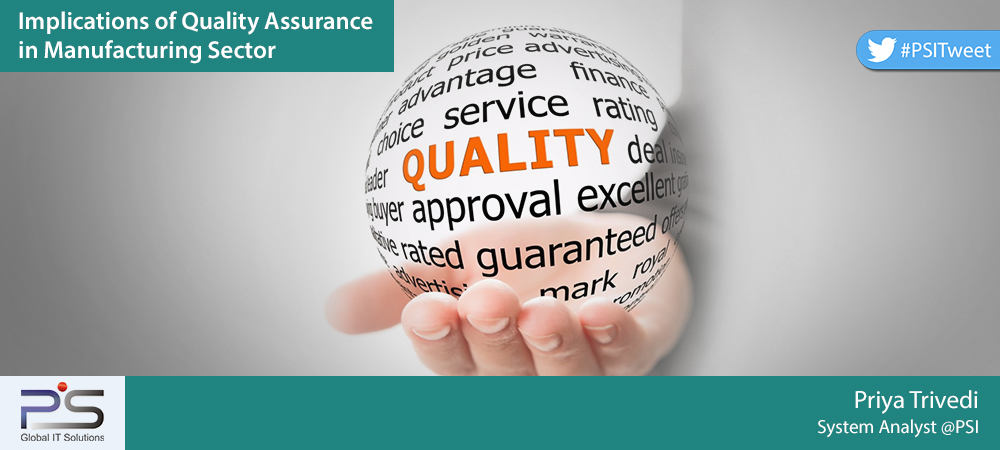
The ‘Make in India’ campaign has definitely hit the right chords for India’s manufacturing sector. It is estimated that India’s manufacturing sector will touch US$ 1 trillion by 2025. This forecasts a potential growth rate of 25-30 percent of the country’s GDP and generate phenomenal job opportunities.
Manufacturing has always remained a forerunner in economies across the world. The sector has evolved over a period of time. Their ecosystems comprise suppliers, customers and other stakeholders. Innovative manufacturing requires intelligent systems to integrate the plant’s operations with business systems and supply chain. But for intelligent data and critical decision making process one requires authentic and accurate data. This requires availability of the right data at the right time validated by the system.
We not only need the functional tests to get the desired output but also the non-functional trials to eliminate the risks associated with the production process. The basic approach is to deliver improved manufacturing methods along with reduced costs.
The major procedures to be followed in business process testing are:
- Homogeneous testing: Creating the industry standards and accepted practices across business functions to enable testing from a focused process perspective.
- Optimum testing: Selecting and synchronizing the best practices across domains to adapt to business conditions.
- Customized testing approach: The customized test suite templates serve the dual purpose of uniformity and right fit strategy.
- Automated processes: The automation tools and frameworks reduce the manual efforts and ensure on time delivery.
- Product assessment: It includes a review and evaluation of applicable product documentation and an assessment of deviations from specified procedures; all batches of product are completely analyzed and approved in accordance with the requirements of the relevant authorizations.
- Product or Process Quality Dispute Support: Product liability actions are often based on the entitlement that some kind of detriment is a result of product defects or process failures.
The smart manufacturing coupled with an integrated approach to floor processes and ERP databases is the next step in manufacturing scenario. The quality assured grouping of the automated technology and intelligence makes it risk free and sustainable. A way to improve business processes, safe work environment and generate employment.
Image Courtesy: www.dfi-eng.comThe ‘Make in India’ campaign has definitely hit the right chords for India’s manufacturing sector. It is estimated that India’s manufacturing sector will touch US$ 1 trillion by 2025. This forecasts a potential growth rate of 25-30 percent of the country’s GDP and generate phenomenal job opportunities.
Manufacturing has always remained a forerunner in economies across the world. The sector has evolved over a period of time. Their ecosystems comprise suppliers, customers and other stakeholders. Innovative manufacturing requires intelligent systems to integrate the plant’s operations with business systems and supply chain. But for intelligent data and critical decision making process one requires authentic and accurate data. This requires availability of the right data at the right time validated by the system.
We not only need the functional tests to get the desired output but also the non-functional trials to eliminate the risks associated with the production process. The basic approach is to deliver improved manufacturing methods along with reduced costs.
The major procedures to be followed in business process testing are:
- Homogeneous testing: Creating the industry standards and accepted practices across business functions to enable testing from a focused process perspective.
- Optimum testing: Selecting and synchronizing the best practices across domains to adapt to business conditions.
- Customized testing approach: The customized test suite templates serve the dual purpose of uniformity and right fit strategy.
- Automated processes: The automation tools and frameworks reduce the manual efforts and ensure on time delivery.
- Product assessment: It includes a review and evaluation of applicable product documentation and an assessment of deviations from specified procedures; all batches of product are completely analysed and approved in accordance with the requirements of the relevant authorizations.
- Product or Process Quality Dispute Support: Product liability actions are often based on the entitlement that some kind of detriment is a result of product defects or process failures.
The smart manufacturing coupled with an integrated approach to floor processes and ERP databases is the next step in manufacturing scenario. The quality assured grouping of the automated technology and intelligence makes it risk free and sustainable. A way to improve business processes, safe work environment and generate employment.
Image Courtesy: www.dfi-eng.com[:]








